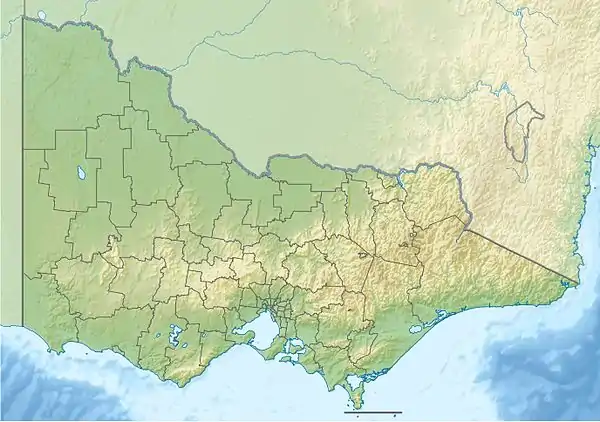| O'Shannassy Dam | |
|---|---|
 Location of the O'Shannassy Reservoir in Victoria | |
| Country | Australia |
| Location | McMahons Creek, Victoria |
| Coordinates | 37°40′30″S 145°48′20″E / 37.67500°S 145.80556°E |
| Purpose | Water supply |
| Status | Operational |
| Construction began | 1922[1] |
| Opening date | 1928 |
| Operator(s) | Melbourne Water |
| Dam and spillways | |
| Type of dam | Embankment with an internal reinforced concrete wall |
| Impounds | O'Shannassy River |
| Height | 34 m (112 ft) |
| Length | 226 m (741 ft) |
| Dam volume | 245,000 m3 (8.7 million cu ft) |
| Spillways | 1 |
| Spillway type | Uncontrolled |
| Spillway capacity | 500 cubic metres per second (18,000 cu ft/s) |
| Reservoir | |
| Creates | O'Shannassy Reservoir |
| Total capacity | 3.123 GL (687 million imp gal; 825 million US gal) |
| Catchment area | 11.9 ha (29 acres) |
| Surface area | 27 ha (67 acres) |
| [2] | |
The O'Shannassy Reservoir is an Australian man-made water supply dammed reservoir. The 3.123 GL (687 million imp gal; 825 million US gal) water store across the O'Shannassy River is located near the locality of McMahons Creek, approximately 80 kilometres (50 mi) east of Melbourne, Victoria. The dam that creates the impoundment is called the O'Shannassy Dam.[3][4]
Location and features
The reservoir is part of Melbourne's water supply system. Water flows under gravity to Silvan Reservoir, then to storage and distribution reservoirs around Melbourne. It is the smallest of the water storage reservoirs managed by Melbourne Water, with a capacity of approximately 3.123 GL (687 million imp gal; 825 million US gal), but it is on a very productive catchment, with stream flow averaging 80 GL (18 billion imp gal; 21 billion US gal) per annum.[5][6][7][8]
The location was selected as it is at sufficient altitude for gravity supply to the elevated eastern suburbs of Melbourne. A diversion weir on the O'Shannassy River and aqueduct to the Surrey Hills Reservoir in Melbourne were completed in 1914. The weir was complemented by the construction of the dam and its reservoir in 1928, but the weir was still used to divert river flows into the aqueduct. The construction of the Yarra-Silvan conduits in the 1950s resulted in reduced requirements for the aqueduct which was decommissioned in 1997.[7][8]
See also
References
- ↑ "ENORMOUS DAMS BEING BUILT". The Ballarat Star. No. 20235. Victoria, Australia. 28 June 1922. p. 10. Retrieved 7 March 2017 – via National Library of Australia.
- ↑ "Register of Large Dams in Australia". Dams information. Australian National Committee on Large Dams. 2010. Archived from the original (Excel (requires download)) on 12 December 2013. Retrieved 22 March 2014.
- ↑ "METROPOLITAN WATER SUPPLY. : Successful and Comprehensive Scheme. How Engineers Overcame Difficulties. Details and Illustrations. No. 5. 0'Shannassy and Upper Yarra system". The Prahran Telegraph. Vol. 67, no. 3416. Victoria, Australia. 4 February 1927. p. 3. Retrieved 7 March 2017 – via National Library of Australia.
- ↑ "A VISIT TO THE WATERSHEDS: NORTHCOTE COUNCIL INSPECT THE O'SHANNASSY SCHEME". The Advertiser. Vol. 68. Victoria, Australia. 25 October 1929. p. 3 (AFTERNOON). Retrieved 7 March 2017 – via National Library of Australia.
- ↑ O'Shannassy Reservoir, Melbourne Water, retrieved 26 May 2019
- ↑ Balassone, Paul (2006), Pigging of the O'Shannassy Outlet Mains (PDF), 69th Annual Victorian Water Industry Engineers and Operators Conference, retrieved 8 September 2010
- 1 2 O'Shannassy Aqueduct Trail, Yarra Ranges National Park (PDF), Parks Victoria, June 2013, retrieved 26 May 2019
- 1 2 Ritchie, E. G. (October 1934), "Melbourne's Water Supply Undertaking" (PDF), Journal of Institution of Engineers Australia, 6: 379–382, archived from the original (PDF) on 18 February 2011